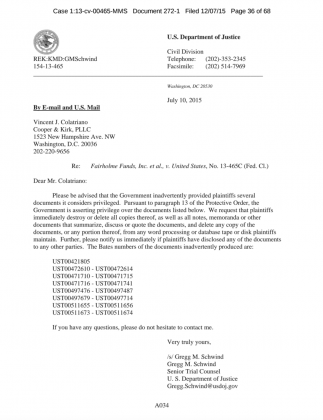Regular readers know I am NOT a believer in huge coincidences like this…
H/T Reader Mark:
On July 10th 2015 Justice Dept lawyer Greg Schwind sent the following letter to plaintiffs attorney’s explaining:
“Please be advised that the Government inadvertently provided plaintiffs several documents it considers privileged. Pursuant to paragraph 13 of the Protective Order, the Government is asserting privilege over the documents listed below.”
On July 13th the government filed for a time extension stating that one of the factors in requesting that extension was:
In this regard, we also note that Gregg M. Schwind, one of the Government’s primary attorneys in this case, left the Department of Justice on July 10, 1015.
In Fairholme’s most recent filing they state the importance of the documents:
First, on July 10, 2015, Defendant informed Plaintiffs that it had “inadvertently provided plaintiffs several documents it considers privileged” and clawed back eight such documents pursuant to paragraph 13 of the Protective Order. Letter from Gregg Schwind to Vincent Colatriano at A034 (July 10, 2015) (attached as Ex. 4). Plaintiffs promptly destroyed all copies of these documents as required by the Protective Order, but informed Defendant that a number of these documents were not included in Defendant’s purportedly final privilege logs. See E-mail from Brian Barnes to Elizabeth Hosford and Gregg Schwind at A036 (July 17, 2015 4:59 PM EST) (attached as Ex. 5). DOJ responded by withdrawing entirely any claim of privilege over four of the eight documents, producing three of the documents subject to very minor redactions, and standing by its assertion of privilege over only one of the documents in its entirety.
See Letter from Elizabeth Hosford to Vincent Colatriano at A038–039 (July 28, 2015) (attached as Ex. 6). Based on Plaintiffs’ review of the four documents Defendant once again produced without redaction, Plaintiffs believe that Defendant’s initial claim of privilege over these documents was wholly untenable. And the fact that Defendant’s counsel withdrew any such claim once challenged suggests that they reached that conclusion as well. Given the baseless nature of Defendant’s claims of privilege over at least half of the clawed back documents—documents that were presumably selected with care, since they were among a very small group of documents that Defendant identified for clawback—Plaintiffs are concerned that many of Defendant’s other claims of privilege may be unwarranted as well.
Now, it is impossible to “know” why Schwind left but like so many other things in this litigation, the timing is indeed more than a little odd.
